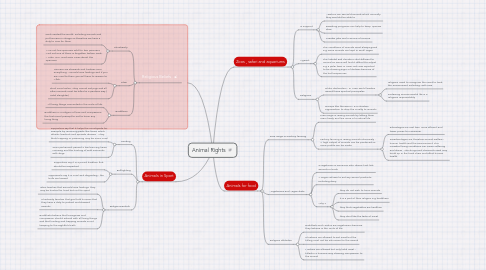
1. Religious Beliefs
1.1. Christianity
1.1.1. God created the world, including animals and put humans in charge so therefore we have a duty to care for them
1.1.2. “Are not five sparrows sold for two pennies? And not one of them is forgotten before God” – Luke 12:6. God even cares about the sparrows
1.2. Islam
1.2.1. Humans are stewards and trustees over everything. Animals have feelings and if you are cruel to them you will have to answer to Allah.
1.2.2. Strict Food Rules. They cannot eat pigs and all other animals must be killed in a painless way ( Halal slaughter)
1.3. Buddhism
1.3.1. All living things connected in the circle of life.
1.3.2. Buddhism is a religion of love and compassion, the first moral precept to not to harm any living thing
2. Animals in Sport
2.1. Hunting
2.1.1. supporters say that it helps the countryside for example by removing pests like foxes, which attacks livestock and spreads disease . They think trapping or poisoning may be more cruel
2.1.2. 2004 parliament passed a law banning hares coursing and the hunting of wild mammals with dogs
2.2. Bullfighting
2.2.1. Supporters say It is a proud tradition that should be respected
2.2.2. Opponents say it is cruel and degrading , the bulls are teased
2.3. Religious Beliefs
2.3.1. Islam teaches that animals have feelings, they may be hunted for food but not for sport
2.3.2. Christanity teaches that god told humans that they have a duty to protect and steward animals
2.3.3. Buddhists believe that lovingness and compassion should extend with all living things and that hunting and trapping animals is not keeping to the Eightfold Path
3. Zoos , safari and aquariums
3.1. In support
3.1.1. Visistors can see wild animals which normally they wouldnt be able to
3.1.2. Breeding programs can help to keep species alive
3.1.3. Creates jobs and a source of income
3.2. Against
3.2.1. The conditions of animals arent always good e.g some animals are kept in small cages
3.2.2. The habitat and climate is alot different to normal so some will find it difficult to adjust e.g a polar bear in New York was reported to be showing signs of distress because of the hot temperures
3.3. Religious
3.3.1. Ohito declaration - in 1995 world leaders issued these spiritual principales
3.3.1.1. religions need to recognise the need to treat the environment including, with care
3.3.1.2. sustaining environmental life is a religious responsibility
3.3.2. Groups like the RSPCA is a christian organisation to stop the cruelty to animals
4. Animals for food
4.1. Free range vs Factory farming
4.1.1. Free range is raising animals by letting them roam freely and live more of a natural life
4.1.2. Factory farming is raising animals intensively . A high output of animals can be produced so more profits can be made
4.1.2.1. advantages are cost less, more effcient and lower prices for consumer
4.1.2.2. Disadvantages are threatens animal welfare , human health and the environment. The crowded living conditions can cause suffering and stress . The drugs and chemicals used may build up in the food chain and affect human health
4.2. Vegetarians and Vegan diets
4.2.1. a vegetarian is someone who doesn't eat fish, animals or birds
4.2.2. A vegan refuses to eat any animal products, including dairy
4.2.3. Why ?
4.2.3.1. they do not wish to harm animals
4.2.3.2. it is a part of their religion e.g buddhism
4.2.3.3. they think vegetables are healthier
4.2.3.4. they dont like the taste of meat
4.3. Religous attitudes
4.3.1. Buddhists and Hindus are vegetarians because they believe in the circle of life
4.3.2. Christians are allowed to eat meat but the killing must not be inhumane for the animal
4.3.3. Muslims are allowed but only halal meat , killed in a humane way showing compassion to the animal
